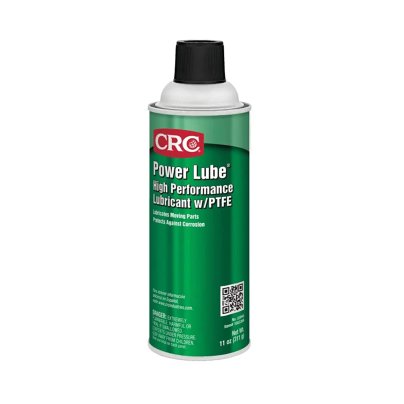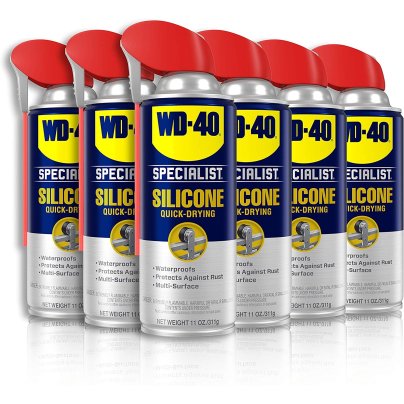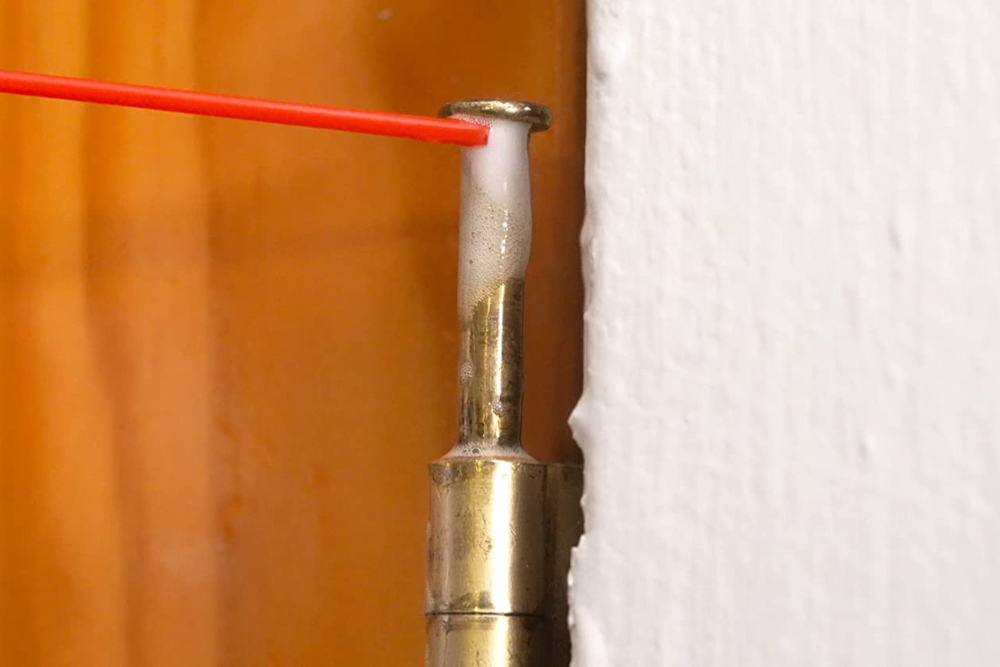
We may earn revenue from the products available on this page and participate in affiliate programs. Learn More ›
While it’s great for setting the mood in a horror movie, the sound of a squeaking hinge can be downright irritating. Whether it’s to avoid waking a baby when opening the nursery door or to keep the dogs from hearing a door open around the time they take their daily walk, squeaky hinges need lubrication. And only the best lubricants for door hinges will do.
The trick is knowing which lubricants really are the best. This guide will explain how you can choose the best lubricant as well as offer some of the top options available.
- BEST OVERALL: CRC Power Lube Industrial High Performance Lubricant
- BEST BANG FOR THE BUCK: WD-40 Specialist Silicone Lubricant
- BEST SILICONE: 3M Silicone Lubricant
- BEST WHITE LITHIUM GREASE: AGS White Lithium Grease
- BEST GRAPHITE: Prime-Line MP66780 Graphite Lubricant Powder
- BEST SPRAY: DuPont Teflon Multi-Use Lubricant
- BEST TUBE: Super Lube-21030 Synthetic Multi-Purpose Grease
- ALSO CONSIDER: DuPont Teflon Silicone Lubricant Squeeze Bottle
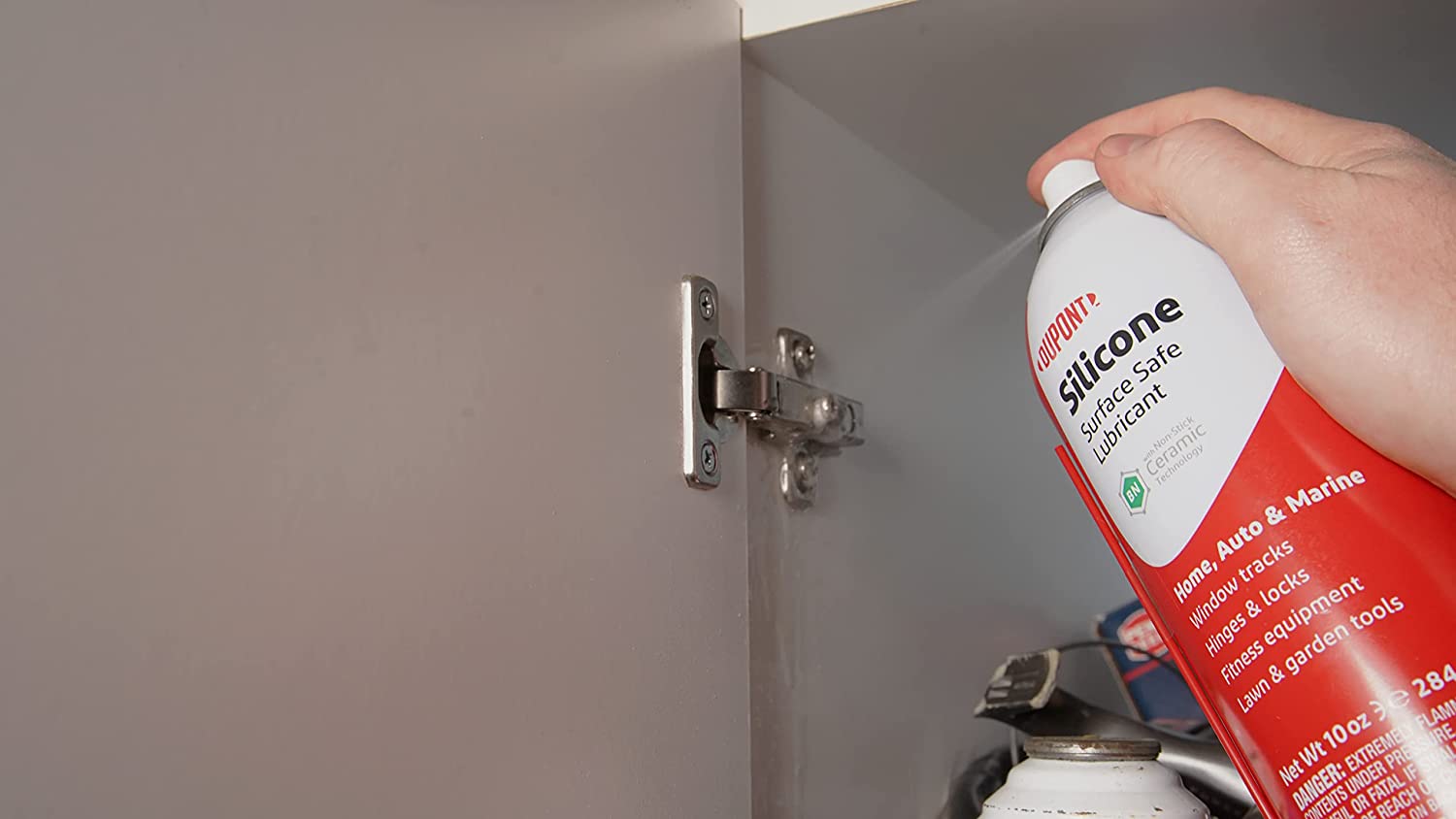
How We Chose the Best Lubricants for Door Hinges
When we decided to assemble a list of the best lubricants for door hinges, we knew we had our work cut out for us. We wanted to avoid causing any friction, and we knew the only way to do so was suggesting only the top-quality products on the market. The Bob Vila research team pooled their own hands-on experience with squeaky door hinges to help guide our decision making when curating our top recommendations.
First, we performed extensive product research on the different types of lubricants and what you should look for. Then, we compiled a long list of products to compare. We assessed them based on formula, application, price, and more to ensure they’d meet our expectations. Those that didn’t were cast away, while those that passed were given awards based on their strengths.
Our Top Picks
That might seem like a lot of information for such a seemingly simple product, but choosing the best lubricant for door hinges could still be intimidating. The following list includes some of the top products on the market, and it should make the shopping process a bit easier.
Best Overall
CRC Power Lube Industrial High Performance Lubricant
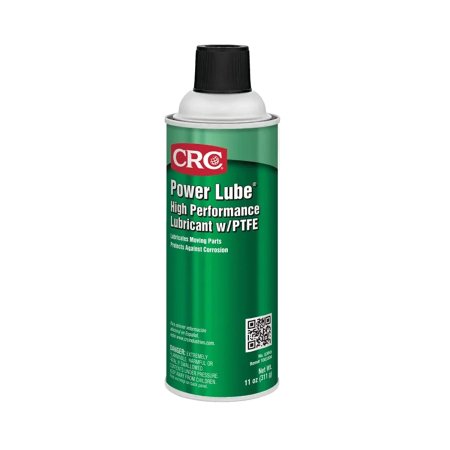
Pros
Cons
Product Specs
- Ingredient: Silicone and PTFE
- Application type: Spray can
- Indoor/outdoor: Both
Folks looking for a top-grade lubricant that can tackle most squeaks should give CRC Power Lube some thought. This silicone-based formula features PTFE, giving it extra lubrication abilities over standard silicone lubes.
The 11-ounce spray can includes a detachable nozzle so users can pinpoint lube application. The formula is suitable for indoor and outdoor applications, including interior and exterior door hinges, garage doors, garden gates, and other metal-on-metal friction. It can also be used to lubricate and protect plastic or rubber, meaning DIYers don’t have to worry about overspray landing on weather stripping. Unfortunately, the silicone formula may collect dust over time, but the formula will lubricate, protect against corrosion, and seal out moisture.
Get the CRC lubricant for door hinges at Amazon, or Walmart.
Best Bang for the Buck
WD-40 Specialist Silicone Lubricant
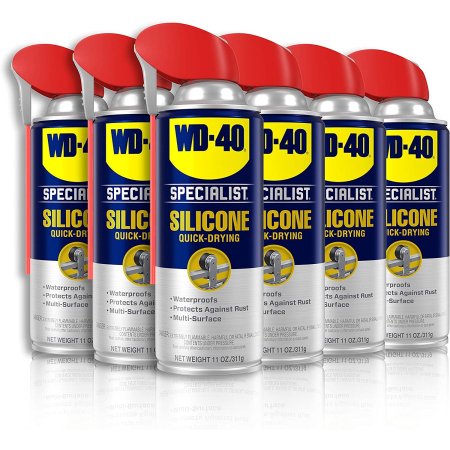
Pros
Cons
Product Specs
- Ingredient: Silicone
- Application type: Spray can
- Indoor/outdoor: Both
Anyone who’d prefer their hinges to stop squeaking for the lowest cost per spray should check out this WD-40 Specialist Silicone Lubricant kit. The pack features six spray cans of WD-40’s silicone formula, allowing users to save money by purchasing in bulk.
These cans offer easy application as each comes with a folding spray tube that helps direct the flow of lubricant. This waterproof lubricant is safe to use on metal, rubber, vinyl, and plastic, meaning users won’t have to worry about accidentally spraying the siding. The formula also cures into a clear film that protects surfaces from corrosion while also reducing friction. It is a silicone-based spray, so there may be dirt and dust buildup over time, but these cans should last for budget-minded shoppers’ many applications.
Get the WD-40 lubricant for door hinges at Amazon or Lowe’s (single unit).
Best Silicone
3M Silicone Lubricant

Pros
Cons
Product Specs
- Ingredient: Silicone
- Application type: Spray can
- Indoor/outdoor: Both
When it comes to silicone lubricants for door hinges, it’s hard to beat 3M’s Silicone Lubricant. This spray can features a formula that prevents squeaks and friction on a variety of materials such as metal, rubber, and plastic parts, including those inside and outside the home as well as in the car or garage.
Since this product doesn’t contain any petroleum oils, DIYers can feel confident that it won’t stain their carpets. Also, this formula has a wide operational range, lubricating in conditions as low as -28 degrees Fahrenheit and as high as 350 degrees Fahrenheit. But, as is the case with all silicone spray lubricants, dust collection can be a problem.
Get the 3M lubricant for door hinges at Amazon or NAPA Auto Parts.
Best White Lithium Grease
AGS White Lithium Grease
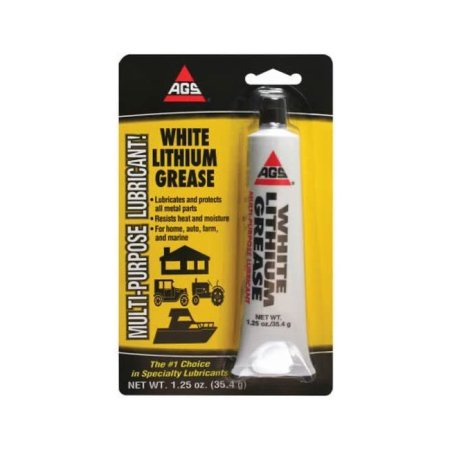
Pros
Cons
Product Specs
- Ingredient: White lithium
- Application type: Squeeze tube
- Indoor/outdoor: Both
Folks looking for a quality white lithium grease might want to check out this product from AGS. Suitable for use both indoors and out, this white lithium grease features a formula that resists both heat and water, helping protect hinges and other parts from corrosion. Although some white lithium greases can be susceptible to freezing, gumming, or running off, this formula prevents that from happening, all while being less likely to collect dust and dirt.
This white lithium grease from AGS comes in two forms: a squeeze tube that allows the user to coat a door hinge with plenty of lubricant, as well as a spray can for easier application. The tube may be slightly tricky to use for applying to the hinges, so it may be worth keeping a small paint brush on hand.
Get the AGS lubricant for door hinges at Amazon, or Walmart.
Best Graphite
Prime-Line MP66780 Graphite Lubricant Powder
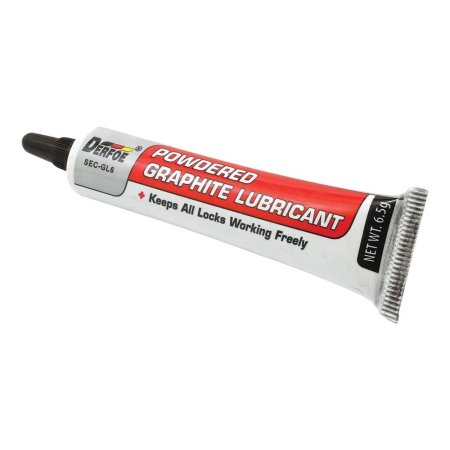
Pros
Cons
Product Specs
- Ingredient: Graphite
- Application type: Squeeze tube
- Indoor/outdoor: Outdoor
Prime-Line’s Graphite Lubricant Powder may be a good choice for folks who want to keep their garage or shop door hinges from squeaking in weather of all kinds. This graphite powder can be applied to leaf hinges and pins to prevent friction. Also, users can even spray it into their locks to ensure they remain smooth and operational.
This powder is suitable for use on metal, plastic, wood, rubber, and other materials. The tube has a needle-nose tip that makes pinpointing a powder as easy as possible. Since it doesn’t have a grease or liquid base, it’s unaffected by hot and cold temperatures and it won’t attract dust. What it will do, however, is stain carpets and woodwork, so be sure to use it outdoors only.
Get the Prime-Line lubricant for door hinges at Amazon.
Best Spray
DuPont Teflon Multi-Use Lubricant
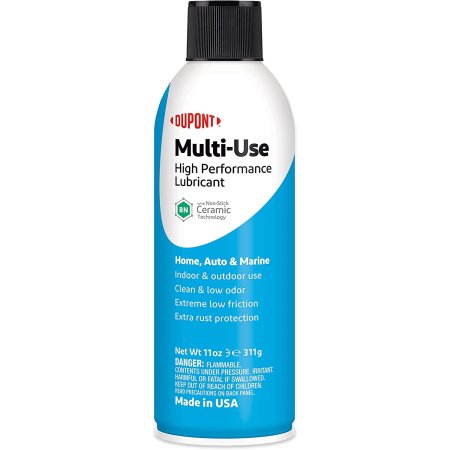
Pros
Cons
Product Specs
- Ingredient: Silicone
- Application type: Spray can
- Indoor/outdoor: Both
Folks who’d like to keep one can of spray lubricant on hand for hinges and other general purposes might want to consider DuPont’s Teflon Multi-Use Lubricant. As the name suggests, this spray lubricant contains Teflon, allowing it to protect longer than standard silicone sprays. It also features corrosion-resistant additives, helping to protect the surface from the elements.
This spray can comes with a detachable straw that makes it easy to apply this lubricant exactly where it needs to go. Applying it to basic leaf hinges is simple, but it’s also suitable for car-door hinges, garage-door hinges, and anywhere else friction may cause squeaking or wear and tear. As a silicone spray, it is susceptible to dust and dirt collection.
Get the DuPont Multi-Use lubricant for door hinges at Amazon, Ace Hardware, or Walmart.
Best Tube
Super Lube-21030 Synthetic Multi-Purpose Grease

Pros
Cons
Product Specs
- Ingredient: Synthetic with PTFE
- Application type: Tube
- Indoor/outdoor: Both
While it’s not silicone, white lithium, or graphite, this tube of Super Lube Multi-Purpose Grease can get the job done. With a synthetic formula containing PTFE, this combination can potentially outlast standard lubricants.
This lubricant works on materials of all types, and it protects against rust and corrosion. It’s suitable for indoor and outdoor hinges, as it won’t melt, drip, or run. Since it’s food-safe and has a wide temperature range (-45 to 450 degrees Fahrenheit), it’s even a good choice for oven hinges and other friction-laden spots within the kitchen. While the tube is handy, a small brush may be necessary to work it into tight spaces.
Get the Super Lube lubricant for door hinges at Amazon, Ace Hardware, or The Home Depot.
Also Consider
DuPont Teflon Silicone Lubricant Squeeze Bottle
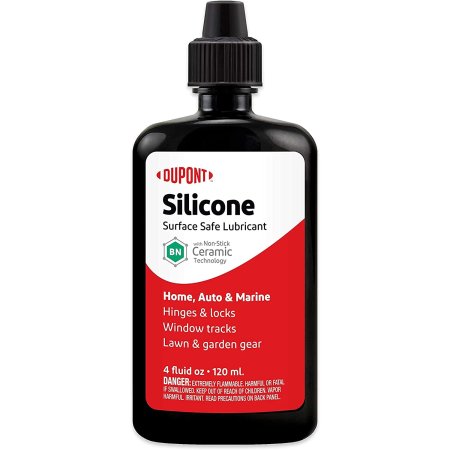
Pros
Cons
Product Specs
- Ingredient: Silicone with PTFE
- Application type: Squeeze bottle
- Indoor/outdoor: Both
Anyone who’d rather not use a grease or spray should consider DuPont’s Teflon Silicone Lubricant Squeeze Bottle. This lubricant is silicone-based and features DuPont’s PTFE (Teflon) to provide long-lasting lubrication for door hinges and other items struggling with friction. It protects against corrosion and repels water.
This lubricant is safe for use on rubber, plastic, vinyl, leather, metal, and wood, meaning it can cover just about any lubrication needed without damaging anything. Since it comes in a squeeze bottle, users can add a few drops to a hinge with ease, keeping the mess to a minimum. Keep in mind that this product may collect dirt and dust after a while, but a quick cleaning and another application of lubricant should do the trick.
Get the DuPont Silicone lubricant for door hinges at Amazon.
Jump to Our Top Picks
What to Consider When Choosing a Lubricant for Door Hinges
Believe it or not, there’s more to lubricating hinges than grabbing a rusty can of oil off the workbench. The following includes some of the most important information for choosing the best lubricant for door hinges.
Ingredients
There are lots of lubricant formulas, but the three ingredients that are most useful for door hinges are silicone, lithium grease, and graphite.
- Silicone is lightweight, inexpensive, and easy to apply. It often comes in spray cans with detachable nozzles. While it doesn’t last as long as some other options, it will perform well in cold temperatures. Keep in mind it does have a tendency to collect dust and dirt.
- White lithium grease is thicker than silicone and typically comes in tubes or spray cans. The tubes are a little trickier to apply and can be messy, but this lubricant lasts longer than silicone. Cold weather can cause it to solidify, but it works very well in hot temperatures and won’t collect dust and dirt.
- The other favorite lubricant ingredient is graphite powder. Graphite is very effective at reducing friction, but it’s extremely messy and can leave dark, smudgelike stains on carpets and woodwork. These lubricants are better for shops and garage doors.
Also, note that many lubricants feature a compound known as PTFE. PTFE, or polytetrafluoroethylene, is essentially Teflon, and it’s a nylon-based lubricant that is very effective at reducing squeaks and protecting hinges.
Hinge
The type of hinge may determine which product to use. Some lubricants are better suited for certain hinges or areas than others, and choosing the right type does matter.
For interior hinges, silicone sprays are typically the best. They’re easy to apply and aren’t very messy. For exterior hinges, the fact that white lithium grease doesn’t collect dust and dirt as readily is prime, especially near driveways and roadways. When it comes to garage doors and workshops, graphite powder is typically a fine choice.
Keep in mind that many of the best lubricants for door hinges not only silence squeaks but also protect against corrosion. Folks who live in damp, humid environments or those living near bodies of salt water may find formulas designed specifically for protection to be the best choice, regardless of the ingredients.
Application
The two most common methods for applying lubricant to a hinge are spraying or squeezing the lubricant from its container.
To spray a hinge, close the door and tap one hinge pin halfway out of the hinge. Spray the pin and where the hinge leaves mesh with the lubricant. Be sure to spray up into the hinge as well. Tap the hinge pin back down before opening and closing the door several times. Repeat on the lower hinges.
To squeeze lubricant on the hinge, close the door and tap the hinge pin completely out of the hinge. Apply a thin bead of lubricant to the pin. Separate the leaves slightly by jostling the door without the pin in place and applying lubricant between where the leaves mesh. Place the pin back in the hinge before opening and closing the door several times to work the lubricant into the hinge. Repeat on the lower hinges.
In either case, it’s a good idea to keep a rag handy to wipe up any excess lubricant.
Tips for Using the Best Lubricants for Door Hinges
Using too much lubricant is rarely the answer. In fact, it can do more harm than good. Big globs of oil and grease will collect dirt, dust, and lint. Not only will this make the hinges look gross, but it will also begin to create friction between moving surfaces. It’s best to apply only as much lubricant as necessary.
When lubricating a hinge, it’s best to lubricate from the inside out. Remove the pin at least partially, and spray it. Spray up into the hinge from the bottom as well. Apply a light coat of lubricant to the outside of the hinge. Make sure to open and close the door several times to work the lubricant between all the moving parts.
Be sure to keep a rag on hand when lubricating hinges. Getting overspray or grease on the woodwork, even if it won’t stain, can affect paint adhesion moving forward. The next time the door or casing receives a coat of paint, the overspray can become evident and require sanding, priming, and painting to hide the grease.
- Don’t use too much lubricant, as it will collect dust and dirt.
- Lubricate the hinge from the inside out.
- Keep a rag handy to clean up any overspray or errant grease.
FAQs
Even with all of that background on the best lubricant for door hinges, there may still be some lingering questions. The following are some of the most frequently asked questions about the topic, along with their answers. Be sure to check for an answer to your question listed below.
Q. Is silicone spray good for door hinges?
Silicone spray is excellent for lubricating door hinges. It’s affordable, easy to apply, and lasts quite a while. Just be sure to wipe up any overspray.
Q. What is the best way to lubricate door hinges?
- Close the door and tap the hinge pin up about halfway.
- Spray or grease the pin.
- Apply spray or grease to the inside of the hinge.
- Apply a thin film to the outside of the hinge.
- Seat the pin.
- Open and close the door several times to work the lubricant into the hinge.
Q. Where do I oil a squeaky door?
In most cases, the squeaks are coming from the hinges. Most doors have two or three, and applying some lubricant to these hinges will be the best way to remove the squeak.
